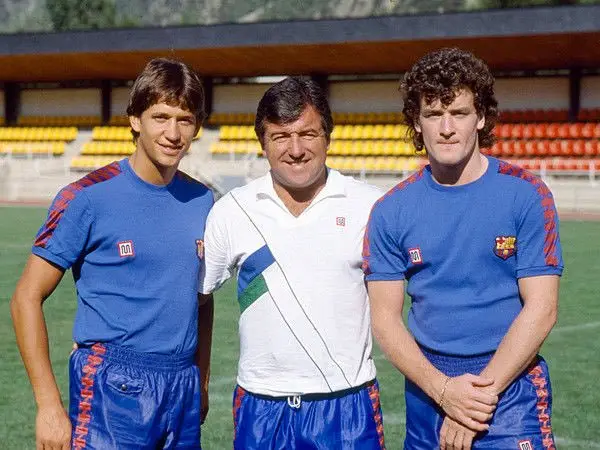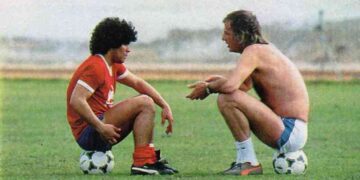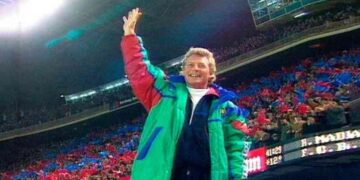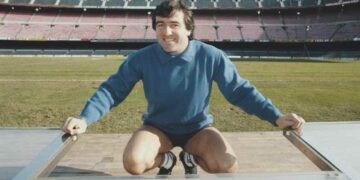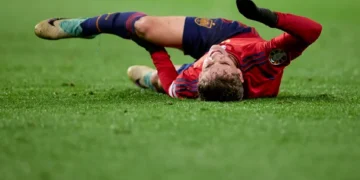During the vibrant 1980s, FC Barcelona witnessed an unforgettable era characterized by the arrival of talented British players and a visionary coach.
The Arrival of the Brits
In the 1980s, FC Barcelona opened its doors to a talented cohort of British players, each bringing their unique flair and skills to the Camp Nou. These players included Gary Lineker, Steven Archibald, Mark Hughes, who quickly became fan favorites and integral members of the squad.
All of these players were brought in by another Brit, Terry Venables, who integrated a 4-4-2 formation into Barcelona’s playing style.
Steven Archibald and Gary Lineker both signed for Barcelona on this day, in 1984 and 1986 respectively.
Steven Archibald
Archibald was bought for £1.15M after an eye-catching season at Spurs where he scored 21 goals in 32 appearances. From 1984 to 1987, the Scottish forward made a significant impact on the team’s attacking prowess. His arrival brought a new dimension to the club’s forward line, as he displayed a combination of skill, agility, and strength that made him a formidable presence in the attack. With 32 goals in 78 games, Archibald’s contributions were instrumental in helping Barcelona secure important victories during his tenure.
Gary Lineker
Gary Lineker impressed Barcelona with a Golden Boot-winning World Cup in 1986 with 6 goals in 5 games, which put a £2.8M price tag on the Englishman. From 1986 to 1989, the English striker made a lasting impression with his clinical goal-scoring ability. Lineker’s arrival brought a wave of anticipation and excitement to the Camp Nou, and he quickly became a fan favorite. With 52 goals and countless impressive performances in 138 games, his stint at Barcelona established him as one of the most respected and admired footballers of his generation, leaving an enduring legacy at the club.
Barça’s first ever Champions Cup final
Furthermore, “El Tel” led Barcelona to their second European Cup Final, first since 1961, where they faced Steaua Bucharest. After 120 minutes of football at the Ramón Sánchez Pizjuán stadium in Seville, despite Barcelona´s domination, the end-result was 0-0 and a penalty shootout was in order.
Remarkably, Steaua’s goalkeeper Helmut Duckadam saved all four of FC Barcelona’s penalties taken by José Alexanko, Ángel Pedraza, Ángel “Pichi” Herrera, and the late Marcos Alonso.
On the other hand, Francisco “Urruti” Urruticoechea managed to save the first two penalties taken by the rivals. But he failed to stop the shots of Marius Lăcătuș and Gavril Balint. Thus ended up being the decisive factors in Steaua’s first and only European Cup triumph, giving Barcelona’s hopeful season a bitted end.
Despite this, reaching the final was still a testament to the club’s rising quality and talent, giving the Blaugrana faithful the privilege of entering the upcoming season with a set of high hopes they previously couldn’t boast.
Terry Venables’ Masterstroke
Under the tactical brilliance and astute man-management of Terry Venables, the Blaugrana embarked on a memorable journey that put an end to an 11-year-long league title drought. The 1984/85 La Liga campaign witnessed Barcelona’s tactical evolution in full swing. Venables’ strategic genius enabled the players to seamlessly adapt to the new system, resulting in fluid ball movement, quick transitions, and cohesive teamwork. The coach’s meticulous attention to detail and ability to inspire the squad instilled a newfound sense of belief and determination. This newfound confidence not only brought joy to Culés all over the world but also elevated the club to the pinnacle of Spanish football, winning their 10th La Liga title, the first since 1974.
Cultural Legacy and Global Recognition
The British era at Barcelona transcended beyond the realm of on-field accomplishments. It was a significant period of cultural exchange and a testament to the club’s progressive outlook. Embracing British talent brought new perspectives and styles. Therefore creating a rich tapestry of footballing diversity.
The presence of renowned British stars like Lineker, Archibald and Hughes caught the attention of football enthusiasts worldwide. Therefore drawing them closer to Barcelona’s story. As a result, FC Barcelona’s international profile skyrocketed during this period. It helped the club gaining admiration and respect from fans and football communities across continents. The British era at the Camp Nou cemented the club’s status as a global footballing powerhouse. Now, the club is cherished by supporters far beyond the borders of Spain.
Discover more from Barça Buzz
Subscribe to get the latest posts sent to your email.


